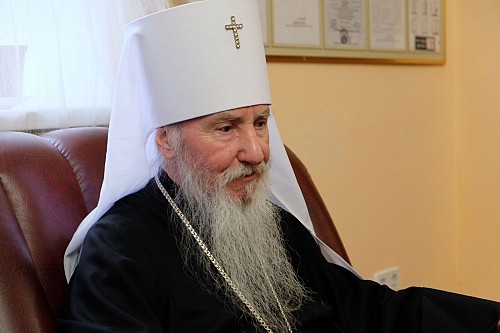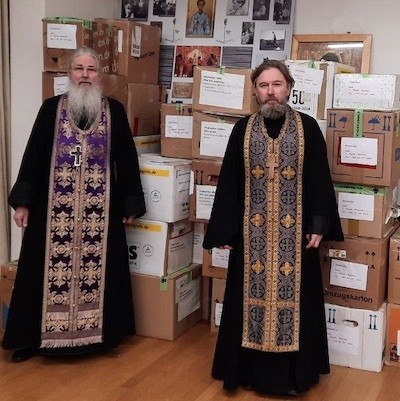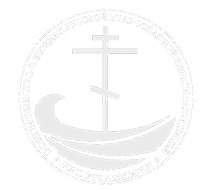In the Ukrainian crisis, the Russian Church Abroad’s Diocese of Berlin & Germany has found itself at the very epicenter of events. Representatives of the Diocese are taking in refugees and seeing to the distribution of aid donated to them. We spoke with Metropolitan Mark of Berlin & Germany about how the Church is helping the suffering. During our conversation I saw how the hierarch – a German by blood, and usually calm and temperate – is genuinely affected by what is taking place. And, as if organically, as question arose within me toward the end that I felt should be placed up front.
– Your Eminence, you are a German by blood, but a Russian bishop. And from your answers, I can tell that you are very much affected by the current situation. Is this a personal tragedy for you?
– It is heartbreaking. For us, Orthodox, there is no difference between Russians and Ukrainians. I am a German, but I speak so rarely in German that I now even have trouble finding the right words. I speak Russian about 80% of the time, with the other 20% in Serbian. German for me only remains upon my forays into the “outside world.”
The current situation, of course, is directly reflected in our parishes, since we have Russians, and Ukrainians, and Belarusians, and Moldovans. We have a single Church, and we all burn as one candle before God.
– The Russian Church Abroad in Germany has launched an aid campaign for refugees from Ukraine. Please tell us what it involves?
– I would not say that it was any kind of campaign. Three bishops from the Church Abroad and one from the Moscow Patriarchate in Europe issued an appeal to the priests and faithful calling for help. Some are able to receive people into their homes, others offer other forms of support. Our youth visit the hospitals. The issue is that most of the refugees do not speak German; some do not even speak English, and thus it is very difficult for them to interact with the doctors. In many cases, this is a necessity, and an urgent one, and we need people who can translate. We have many areas in which our faithful are able to offer assistance.
– Can you share some details about how help is being offered?
– Unfortunately, I do not know any figures offhand, because they change not even day to day, but minute to minute.
Additionally, there are moments that do not lend themselves to figures. For example, the aid that we send to the parishes of the canonical Ukrainian Orthodox Church under the leadership of His Beatitude, Metropolitan Onufry – we send clothes, food, blankets. I have not called Metropolitan Onufry himself for the time being – for one thing, it is currently Great Lent, when we traditionally hold many divine services. For another I understand how very busy he is right now, and I simply do not want to distract him.
– Is ROCOR offering any aid to the refugees fleeing to Russia? They are also refugees, they also need help…
– I heard that they are getting more help even from America than from Russia. We see many people arriving here to us every day, and we need to help them.
– Has the Russian Church in Germany and in the West in general, or her clergy and flock, been experiencing any difficulties or pressure because of their attachment to Russia?
– Yes. Our churches have been subject to acts of vandalism, and our faithful have suffered verbal assaults. But I have to say that these are ultimately isolated cases. I would say that people are beginning to see the difference, and do not consider us – or the Russian people as a whole – to be aggressors.
For instance, right now in Germany, about 1,000 Russian truck drivers have been stranded at the truck stops. They were just in the middle of their routes when everything began, and now they cannot get out. They have no money, their telephones do not work, and they are freezing and starving. And so, many people are taking it upon themselves to travel the roads and help these people. Both Germans and our faithful will drive up and down the highways in search of these truck drivers, who after all cannot call anyone, nor is there any information available about them. Of course, we help wherever we can. But it is entirely likely that there are those whom we do not yet know anything about, inasmuch as people can get stranded in the widest variety of places.
– Right now, everyone is facing a very trying time, many throw up their hands, overwhelmed by emotions. What can we do in this situation?
– First and foremost, pray. We must not underestimate the power of prayer. Especially now, during Great Lent. After all, there is a reason that the Church calls on the faithful to attend the divine services with greater frequency during this period, namely to beseech God’s aid, rather than man’s.
What is important is that our prayer be accompanied by fasting, confession, and repentance.
Dmitry Zlodorev
Washington
|






